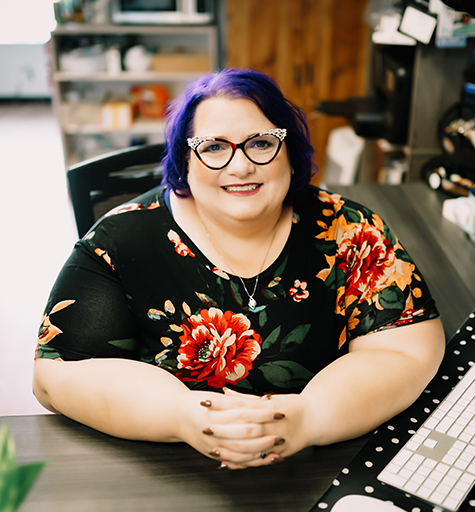Show Notes
In this episode, Allie and Michelle discuss how the recent boom of tech layoffs can disproportionately affect underrepresented people and cause a unique set of struggles for them.
Episode Transcript
Audio:
Welcome to the Underrepresented in Tech podcast, hosted by Michelle Frechette and Allie Nimmons. Underrepresented in Tech is a free database built with the goal of helping people find new opportunities in WordPress and tech overall.
Michelle Frechette:
Hi, Allie.
Allie Nimmons:
Hi, Michelle. How are you?
Michelle Frechette:
I’m good. How are you?
Allie Nimmons:
I’m great. I love that we are matching today. People can’t see us, but we’re both in black shirts with pretty red, pink flowers on them, and we look like twins.
Michelle Frechette:
Yes. Yes, exactly. Yeah. I always feel happy when I talk to you, but this week has not been a happy week for a lot of people.
Allie Nimmons:
Yeah.
Michelle Frechette:
And actually, over the last month, it’s been hard because tech layoffs really started probably in December if we’re being honest, right? With Stripe and some of the bigger companies.
Allie Nimmons:
Google.
Michelle Frechette:
Twitter, of course. But yesterday, last night actually, GoDaddy announced that 8% of its workforce was being laid off. And you and I are part of the community which is the same part of the community that GoDaddy is.
And you used to be, I don’t know if you still are, an ambassador for GoDaddy, so you know even more people there than I do. It’s not easy. It’s not easy. I’m feeling sympathetic and I’m sad. And I have a job. I feel really bad. And I can’t imagine what it feels like to be one of the people that has been laid off and got that horrible notification yesterday.
But one of the things you had talked about was it’s hard enough to be a white cishet male in tech and be laid off as much as it is to be underrepresented. Yes, what are some of your thoughts about that?
Allie Nimmons:
Yeah. It’s been a really scary time. I have some friends that have been at GoDaddy a year. I saw someone on Twitter today who… they were at GoDaddy for 18 years, and they were part of that layoff.
I don’t know what the criteria was for laying people off, if it was random or what it was based off of. I have friends at other tech companies who are basically just like, “Yeah, I’m just updating my LinkedIn and waiting for the facts to fall.”
People are living in fear, and it’s really scary. And a lot of the people that I know, I’d say the majority of the people I know who are affected by this have been underrepresented people.
Michelle Frechette:
That’s not to say we thought that there was… They didn’t seek out underrepresented people. It’s just that we know-
Allie Nimmons:
No. I don’t think that that’s the case. Yeah. I don’t think that that’s the case, especially not in the case of GoDaddy. I can’t speak for all companies. But at least for the GoDaddy thing, I’m certain that that was not a factor.
But when you already live with the imposter syndrome of, well, I barely feel like I’m good enough for the job I have, I’m feeling like I have to work twice as hard to get the recognition that I deserve. I’m feeling burnt out because I have all of these additional stressors and responsibilities.
To have to live with the circumstance that’s completely beyond your control as well… Because there’s only so many things we have control over. We have control over our performance, how hard we work, how much we show up, how much we network, all these other things.
And then to know that there’s this looming thing of all these layoffs. You’re seeing people get laid off left. And you’re thinking, well, what can I do additionally now that could save me, that could prevent this from happening to me? And maybe feeling like, well, there’s nothing I can do. It’s going to be random, or it’s based off of who’s been here longer, or whatever the case might be. That is doubly scary.
Michelle Frechette:
Absolutely.
Allie Nimmons:
And then the idea that you then have to go back out into the workforce and hustle and try to send out resumes all over again and compete now. Because that’s the other factor is, with all of these layoffs, it means that we have this flood of people interviewing and applying for jobs that don’t exist. So it’s now doubly as competitive as it was before.
Michelle Frechette:
[inaudible 00:04:18] really interesting too, if you think about it, is… I think we discussed this a while back, where a lot of companies do the last-in, first-out when it comes to layoffs.
And over the last, I would say three to five years, I wish it was more than that, but really, probably more realistically, the last three years, more companies have focused on the DEIB components of underrepresentation and inclusion in their companies. And when you’re talking about diversity, equity, inclusion, and belonging, if you’ve really worked hard for DEIB over the last three years and you’re doing the last-in, first-out, those people who are underrepresented will then be the first ones out again.
And I don’t know what GoDaddy did, and we’re absolutely not saying anything about that. It’s just that what happened yesterday at GoDaddy brings it all up for us as a community as to how we’re all connected. But if companies are doing layoffs and that’s the way they do things, then they are undoing a lot of the inclusive work that they have been striving to do over the last few years.
Allie Nimmons:
Yeah. And it also makes me think about… I feel super lucky that where I work, at MasterWP, my boss has been really… he’s always been very transparent with us about how the company is doing financially and what that means for our growth or if we need to scale things back or whatever.
And I feel like he’s taken extra steps to show us, okay, things are doing well. We’re bringing in this amount of money. Kind of telling us, “Your jobs are safe. I’m not worried. You shouldn’t be worried either.” And that makes me feel amazing because I know, again, that I’m in control of my employment.
If I’m going to get fired, it’s going to be because of typical circumstances, performance, or whatever. So I’ve spoken to other people who are like, “Yeah, I hear about all of these tech layoffs. You work in tech. Are you worried?”
And I’m like, “Thankfully, I don’t have to be worried because I have a boss that’s communicating with me.” MasterWP is not a huge… It’s not Google. It’s not GoDaddy. It’s not a huge company. I think if you are at a gigantic company, you can feel like a much smaller piece to that bigger picture, and you don’t get that transparency.
So my advice for employers would be; put people’s minds at ease as much as you can because then what you have is people who are soft quitting. I have a friend at a company.
Michelle Frechette:
Quiet quitting.
Allie Nimmons:
Yeah. Quiet quitting. That’s what it is. Sorry. I have a friend of mine who works at… I’m not going to name the company. It’s not a WordPress company, but it is a tech company.
And she’s like, “I’ve been watching people get fired the last couple of months. I am looking at jobs. I’ve been interviewing. I got my resume ready.” And she’s like, “The second they show me the door, I’m going to be ready.” And so she’s spending energy and time not doing her job because she doesn’t have that security.
Michelle Frechette:
It feels funereal, right? So you’re sitting at a company that’s just lost 8% of their workforce, and you’re starting to feel like you’re at calling hours for a funeral because of the mass exodus of the people that have been told they have to leave.
And then watching their accounts get shut off. Their emails bounce. They’re no longer in Slack, all the tools that we use to communicate. And if you haven’t shared communication opportunities with those people outside of your work, then you completely have lost access to them without some serious social sleuthing to see if they even exist on Twitter or Facebook or LinkedIn.
Allie Nimmons:
And I am thinking too about the people who remain and now have to pick up extra slack, extra work, all of that extra… I have another friend who works at Google. And they were telling me they’re having to work on Saturdays and stuff because there’s extra work that has to be done.
And as the company is reacting to this massive amount of people who are gone, the people who are left have to pick up that slack. And underrepresented people, they’re bound to be… The person I’m speaking of is an underrepresented person.
And on top of everything else they have to deal with and think about and feel, they now have to work extra hours. And it’s a situation where it’s like, well, you can’t say, “Well, I’m not going to do that.” Because your job is already on the edge of the cliff.
Michelle Frechette:
It’s hanging in the balance as it is.
Allie Nimmons:
Yeah.
Michelle Frechette:
Let’s talk about some tools and some things that can help people. Number one, a lot of us in tech have side gigs. If you do get laid off today or tomorrow or yesterday or whatever, yes, it makes things a lot more difficult because you’re looking at your health insurance, you’re looking at your income.
But at least with some side gigs, maybe you can keep the lights on, you can keep the rent paid, things like that, while you search for another job. So side gigs are always something that feels like that safety net, security blanket kind of thing.
But also, make sure that you’re polishing your LinkedIn. LinkedIn is someplace people look, for sure. Make sure that your resume is up to date. Even if you have to spend a little bit of money to have somebody take a look at it, it’s worth the investment in your future job-
Allie Nimmons:
In the long term.
Michelle Frechette:
Absolutely. We’ll come to the Underrepresented in Tech database in just a second because that’s a huge tool, of course. But also, every Wednesday… And it’s funny because I didn’t do it this Wednesday. I did it today.
Every Wednesday, I tweet out Work Wednesday for WordPress and anywhere between eight to 10 companies that are hiring, and then also link back to the wpcareerpages.com site that I built. And I didn’t do it yesterday because I was overwhelmed with other things. I thought, “Oh, I’ll just do it tomorrow.”
And it happened to fall today, which is after the layoffs. So if you are somebody who’s listening and you’re having to look for a job, go to wpcareerpages.com. There’s almost 100 sites of WordPress companies that do hire. And the weekly tweets that I put out will allow you to look through some of those things, for sure.
And then there are sites like Post Status that put job postings as well. But the Underrepresented in Tech database is a place where you can put information out there. You can get hired for gigs. You can get hired for full-time, part-time work. You can get asked to be a guest on a podcast like ours because we do that on occasion.
Allie Nimmons:
[inaudible 00:10:51]
Michelle Frechette:
That’s right. Or guest post, guest blog, things like that. And then it’s never a bad time to sharpen your skills through things like LinkedIn learning. Allie has classes that she’s got up on LinkedIn Learning and YouTube classes and things like that. So there’s lots of opportunities to use this time to catapult yourself forward a little bit, even though it feels like the world’s falling down around you.
Allie Nimmons:
Yeah. Absolutely. And I feel like we don’t talk about it enough; we have a resources page on the Underrepresented in Tech website. And there’s a whole job search resources section.
So we have the Post Status job board. We have the WP Career Pages. We have a list of Black-founded companies that are hiring, how to find a WordPress developer job, job board and community for Black women, and a handful of other things, as well as tech resources, business tools, all kinds of other stuff.
So there’s stuff on there if you have been affected by this and you are looking for a place to start. There are some really interesting links there. And we have other podcast episodes about resumes and about applying for jobs.
Michelle Frechette:
[inaudible 00:12:00]
Allie Nimmons:
Yeah. In the show notes for this show, for this episode, I’m going to put links to some of those past ones, and I’ll also tweet them out as well. So if you’re just looking for two kind voices to give you some motivation-
Michelle Frechette:
We’re here.
Allie Nimmons:
… we’re here for you.
Michelle Frechette:
But also remember that if you join the Underrepresented in Tech podcast, you get a free membership to Post Status.
Allie Nimmons:
Database.
Michelle Frechette:
And that’s a great opportunity… What did I say? Podcast?
Allie Nimmons:
If you join the… Yeah.
Michelle Frechette:
If you join the database. Sorry. If you join the database, then you get a free membership to Post Status. And that’s an opportunity to talk to people in WordPress through our Slack channel, for sure, and be able to DM people and work that way too, looking for gigs. [inaudible 00:12:42], our hearts are out to you, for sure.
Allie Nimmons:
Yeah. One thing I will also definitely say. We talked about LinkedIn. We talked about resumes. Make sure your Twitter, if you’re on Twitter, whatever social media you’re using, make sure your Twitter bio has your first and last name, what you do, and a way to get in touch with you. Right? Because there’s nothing…
Michelle Frechette:
[inaudible 00:13:06]
Allie Nimmons:
Yeah. As much of that stuff as possible. Because I can’t tell you how many times I’ve been like, “Oh, I really want to recommend this person for a job.” And really, the only way I have…
Say Michelle is hiring. And I’m like, “Oh, my friend Jordy is looking for a job.” And I want to send Michelle Jordy’s Twitter so she can get in touch with him, but his Twitter doesn’t have his first and last name, it doesn’t have a very descriptive bio, it doesn’t have a website. What is Michelle supposed to do?
Michelle Frechette:
DMs aren’t open, right? So they’ve closed off [inaudible 00:13:36].
Allie Nimmons:
Yeah.
Michelle Frechette:
Yeah. It makes it difficult, for sure.
Allie Nimmons:
So make sure that stuff is in so that, at a glance, people can see exactly what it is that you do, and they can immediately make that impression of you and qualify, yes, we are looking for a social media manager. We are looking for a front-end dev.
Otherwise, they have to go off of maybe what somebody else said. And word of mouth is really effective and important when it comes to hiring. But when you have people who are looking at multiple candidates a day, make it easy for them to completely, fully understand who you are, what you do, what you’re looking for.
And I think that because so much of our community thrives on Twitter right now still, regardless of everything, I think your Twitter bio is really a strong place.
Michelle Frechette:
Absolutely. [inaudible 00:14:25]. Yeah. All of that.
Allie Nimmons:
And it doesn’t mean it has to lack personality. When you go to my Twitter, you got my purple-haired picture. You got a meme in the thing at the top. I have my emojis in my thing. But it has my first and last name. It has exactly what I do and the companies that I work with and a link to my website.
Michelle Frechette:
Absolutely.
Allie Nimmons:
So it’s totally possible.
Michelle Frechette:
Absolutely. So all that to say, absolutely, there’s ways… Our hearts go out to you if you are part of the recent tech layoffs. We do have resources. Please find us on the underrepresentedintech.com website. Find the resources there.
We are here to help you through these difficult times. But also, Allie and I are headed to Thailand next week. I’m going to be in Thailand for 10 days. I’ll be gone this Monday afternoon through the following Thursday when I get back, which means I think we’re going to try to record an episode in Thailand, but we’re not going to record two episodes in Thailand. We’re going to take a week off because of travel.
Allie Nimmons:
Yeah. At some point.
Michelle Frechette:
We’re going to be pretty tired. But we’ll see you see at some point next week from Thailand, in person. And then the week after, we’ll have a much-needed relaxation week. And then after that, we’ll be hitting it hard with y’all again.
Allie Nimmons:
Yeah. And if you’re going to be in Thailand, come find us. Say hi. Michelle will have stickers that we can give out.
Michelle Frechette:
I have so many stickers.
Allie Nimmons:
It’ll be really good. I’m so excited. This time next week, Michelle, I will be standing next to you, holding your hand.
Michelle Frechette:
[inaudible 00:15:54]
Allie Nimmons:
We’ll be doing exciting things together. It’s going to be really great.
Michelle Frechette:
I keep telling people, prepare for an uncomfortably long hug if you’re a hugger.
Allie Nimmons:
Yes.
Michelle Frechette:
If not, I will respect your distance.
Allie Nimmons:
All right.
Michelle Frechette:
Anyway. See y’all on the flip side.
Allie Nimmons:
See you later. Bye.
Audio:
This episode was sponsored by the following companies: YIKES, Inc. YIKES, Inc. is a collaborative, results-driven, Philadelphia-based WordPress agency dedicated to sustainable business practices.
Thank you so much to our sponsors for this episode. If you’re interested in sponsoring an episode, using our database, or just want to say hi, go to underrepresentedintech.com. See you next week.
This episode was sponsored by YIKES, Inc. YIKES, Inc. is a collaborative, results-driven, Philadelphia-based WordPress agency dedicated to sustainable business practices.

Allie Nimmons
Host

Michelle Frechette
Host


